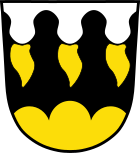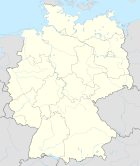Iging
| coat of arms | Germany map | |
|---|---|---|

|
Coordinates: 48 ° 4 ′ N , 10 ° 49 ′ E |
|
| Basic data | ||
| State : | Bavaria | |
| Administrative region : | Upper Bavaria | |
| County : | Landsberg am Lech | |
| Management Community : | Iging | |
| Height : | 594 m above sea level NHN | |
| Area : | 26.34 km 2 | |
| Residents: | 2488 (Dec. 31, 2019) | |
| Population density : | 94 inhabitants per km 2 | |
| Postal code : | 86859 | |
| Area code : | 08248 | |
| License plate : | LL | |
| Community key : | 09 1 81 127 | |
| LOCODE : | DE ZHW | |
| Community structure: | 8 parts of the community | |
| Association administration address: | Donnersbergstrasse 1 86859 Igling |
|
| Website : | ||
| Mayor : | Günter Först (Free Voters) | |
| Location of the community of Igling in the Landsberg am Lech district | ||
Igling is a municipality in the Upper Bavarian district of Landsberg am Lech and the seat of the administrative community Igling . The place of the same name is both the capital and the seat of the municipal administration.
geography
The community is located west of the Lech at the transition from the hilly pre-alpine moraine landscape to the flat Lechfeld . The Singold flows through the western municipality .
The municipal area extends from 582 m to the 686 m high Upper Riedberg .
Parish parts
There are eight officially named municipal parts (the type of settlement is given in brackets ):
|
|
There are the districts of Holzhausen near Buchloe, Oberigling and Unterigling.
history
Until the church is planted
The place was part of the Duchy or Electorate of Bavaria and formed a closed Hofmark , whose seat was Oberigling.
For the support of Duke Albrecht IV of Bavaria-Munich in the Landshut War of Succession , he transferred the Hofmark Igling with the associated castle to the Augsburg patrician Johann IX on St. Nicholas Day 1504 . Long coat from the rafter († 1505). From his family, the property came to the Bavarian Colonel Chancellor Joachim Freiherr von Donnersberg , who is buried in the Oberiglinger church and has an artistic epitaph there, via the Rehlinger family .
In the course of the administrative reforms in the Kingdom of Bavaria , the municipal edict of 1818 created the municipalities of Oberigling and Unterigling.
20th century
In the Second World War, large areas were expropriated. The castle was confiscated by the SS and after the war was a branch of the Landsberg correctional facility . Camp II of the Landsberg / Kaufering subcamp group of the Dachau concentration camp was located here until 1945 . Then displaced persons were housed in the castle.
The train station on the Allgäubahn Munich - Memmingen no longer exists today.
Merger
On April 1, 1971, the previously independent municipalities of Oberigling and Unterigling were merged to form the new municipality of Igling.
Incorporations
The previously independent community of Holzhausen near Buchloe was incorporated on May 1, 1978.
Population development
- 1961: 2041 inhabitants, 659 of them in Holzhausen near Buchloe, 946 in Oberigling and 436 in Unterigling
- 1970: 1,656 inhabitants, 613 of them in Holzhausen near Buchloe, 632 in Oberigling and 411 in Unterigling
- 1987: 1767 inhabitants
- 1991: 1846 inhabitants
- 1995: 1952 inhabitants
- 2000: 2125 inhabitants
- 2005: 2407 inhabitants
- 2010: 2356 inhabitants
- 2015: 2495 inhabitants
- 2018: 2522 inhabitants
- 2019: 2488 inhabitants
Between 1988 and 2019 the community grew from 1806 to 2488 by 682 inhabitants or by 37.8%.
politics
mayor
The first mayor is Günter Först (Free Voters Igling-Holzhausen). He was elected on September 30, 2012 in a runoff election with 54.5% of the vote and a turnout of 62.9%.
Municipal council
| year | CSU | SPD | FW | DGH | DGI | total | Voter turnout in% |
|---|---|---|---|---|---|---|---|
| 2008 | 0 | 0 | 4th | 4th | 6th | 14th | 74.3 |
| 2002 | 2 | 3 | 5 | 4th | 0 | 14th | 75.7 |
- FW = Free Voters Igling-Holzhausen
- DGH = Holzhausen village community
- DGI = Igling village community
coat of arms
| Blazon : "Over the golden three-mountain in black, three golden flames flickering out of the silver cloud-shield head." | |
Culture and sights
See: List of architectural monuments in Igling
- Igling Castle , privately owned, with a castle restaurant, nine-hole golf course and pro shop.
- Catholic parish church of John the Baptist in Unterigling , baroque church with frescoes by Johann Georg Lederer
- Catholic parish church of St. Peter and Paul in Oberigling
- Holzhauser country brewery with beer garden, Igling-Holzhausen
- Iglinger summer cellar, disco and night bar
- Two concentration camp cemeteries , one at the gravel pit with 2000 concentration camp victims and one in the forest on the Stoffersberg with 490 concentration camp dead; the associated memorial stones remember the victims of forced labor from the Kaufering subcamp group . At the concentration camp cemetery Holzhausen 94 prisoners were buried after the liberation of the concentration camp died.
Soil monuments
Economy and Infrastructure
Economy including agriculture and forestry
In 1998, according to official statistics, there were no employees at the place of work in the manufacturing sector 110 or in the trade and transport sector. In other economic sectors 74 people were employed at the place of work subject to social security contributions. There were a total of 1,424 employees at the place of residence subject to social security contributions. There were four companies in the manufacturing sector and three in the construction sector. In addition, in 1999 there were 20 farms with an agriculturally used area of 375 ha, of which 259 ha were arable land and 111 ha were permanent green space.
traffic
The Allgäu Railway runs through the community from Munich to Lindau . Until 1983 Igling had its own train station. This was put into operation on November 1, 1872 by the Royal Bavarian State Railways with the section of the Bavarian Allgäu Railway from Buchloe to Kaufering . The railway line closed in Buchloe on the Ludwig-Süd-Nord-Bahn to Lindau via Kaufbeuren , Biessenhofen , Kempten , Immenstadt and Hergatz . Continuous connections have existed between Igling and Munich since May 1, 1873, as the last section of the Allgäu Railway from Kaufering via Geltendorf to Munich was put into operation. The station had a reception building and three tracks. Two tracks were intended for passenger traffic and were located on a house and on a side platform. In 1983 the Deutsche Bundesbahn closed the station due to insufficient passenger numbers, the siding and the associated platform was dismantled. The outer platform on the opposite track and the station building have been preserved to this day. In the 1990s, another provisional signal box was set up in Igling, as the Allgäu Railway could only be driven on a single track due to a construction site.
Today the community can only be reached by public transport by bus. Igling is integrated into the Landsberger Verkehrsgemeinschaft (LVG); the community is served by bus route 31 from Landsberg to Obermeitingen. In Obermeitingen there is a connection to buses from the Augsburger Verkehrsverbund (AVV) to Augsburg.
education
In the school year 2014/15 there were four educational institutions in the municipality:
- Daycare center with 90 places
- Primary school with 160 students and nine full-time teachers (SJ 2016/2017)
- Regens-Wagner-Schule , private support center with 241 students in 26 classes, in the Holzhausen district
- Regens-Wagner-Schule, private vocational school for special needs education with 61 students in six classes, in the district of Holzhausen
literature
- Joachim Dellinger: Igling, Schloß and Hofmark in the royal district court Landsberg, with the Stoffersberg and Erpfting . In: Upper Bavarian Archive for Patriotic History (Historical Association of Upper Bavaria, Ed.), Volume 12, Munich 1852, pp. 3-60 ( online )
- Landsberg Citizens' Association in the 20th Century: Death March and Liberation - Landsberg in April 1945: The end of the Holocaust in Bavaria. Landsberg 1993, ISBN 3-9803775-1-2 .
- Landsberg citizens' association in the 20th century: The Kaufering concentration camp command 1944/45: The extermination of the Jews in the "Ringeltaube" armaments project. Landsberg 1993, ISBN 3-9803775-3-9 .
Web links
Individual evidence
- ↑ "Data 2" sheet, Statistical Report A1200C 202041 Population of the municipalities, districts and administrative districts 1st quarter 2020 (population based on the 2011 census) ( help ).
- ^ Community Igling in the local database of the Bavarian State Library Online . Bavarian State Library, accessed on September 8, 2019.
- ↑ Johann Georg von Lori : History of Lechrain , Volume 2, p. 244, (Regest of the deed of transfer)
- ^ Political mishaps for and about southern Germany , Volume 2, p. 59, Munich, 1805; (Digital scan)
- ↑ Report in the Traunsteiner Tagblatt about the Landshut War of Succession with mention of Langenmantel
- ↑ Michael Wening : Description of the Elector and Duchy of Upper and Nidern Bavaria . Part I, Munich 1701, p. 139.
- ↑ The Holocaust in the Landsberg of civic association Landsberg in the 20th century to the study of contemporary history Landsberger eV
- ↑ The European Holocaust Memorial - a place of remembrance of the concentration camp complex Kaufering / Landsberg from the founders of the memorial of the citizens' association Landsberg in the 20th century for researching Landsberger Zeitgeschichte eV
- ^ Wilhelm Volkert (ed.): Handbook of Bavarian offices, communities and courts 1799–1980 . CH Beck, Munich 1983, ISBN 3-406-09669-7 , p. 507 .
- ^ Federal Statistical Office (ed.): Historical municipality directory for the Federal Republic of Germany. Name, border and key number changes in municipalities, counties and administrative districts from May 27, 1970 to December 31, 1982 . W. Kohlhammer, Stuttgart / Mainz 1983, ISBN 3-17-003263-1 , p. 580 .
- ↑ Municipal Council. Igling parish, accessed on 23 August 2020 .
- ^ Entry on the coat of arms of Igling in the database of the House of Bavarian History
- ↑ Memorial sites for the victims of National Socialism. A documentation, volume 1. Federal Agency for Civic Education, Bonn 1995, ISBN 3-89331-208-0 , p. 149 f.
- ^ Dumjahn: Manual of the German railway lines . Dumjahn, Mainz 1984, ISBN 3-921426-29-4 .
- ^ Siegfried Bufe: Allgäubahn, Munich – Kempten – Lindau . Bufe, Egglham 1991, ISBN 3-922138-41-1 .
- ↑ Roman Dilken: A virtual journey on the KBS 970 from Munich to Lindau ( Memento of 19 January 2019 Internet Archive ). In: kbs970.de .
- ↑ Roman Dilken: image of the former platform ( Memento of 26 April 2016 Internet Archive ). In: kbs970.de .
- ^ Landsberger Verkehrsgemeinschaft: Regional line network. In: lvg-bus.de , December 15, 2019, accessed November 30, 2019.
- ^ Igling elementary school in the school database of the Bavarian State Ministry for Education and Culture , accessed on December 21, 2017.














